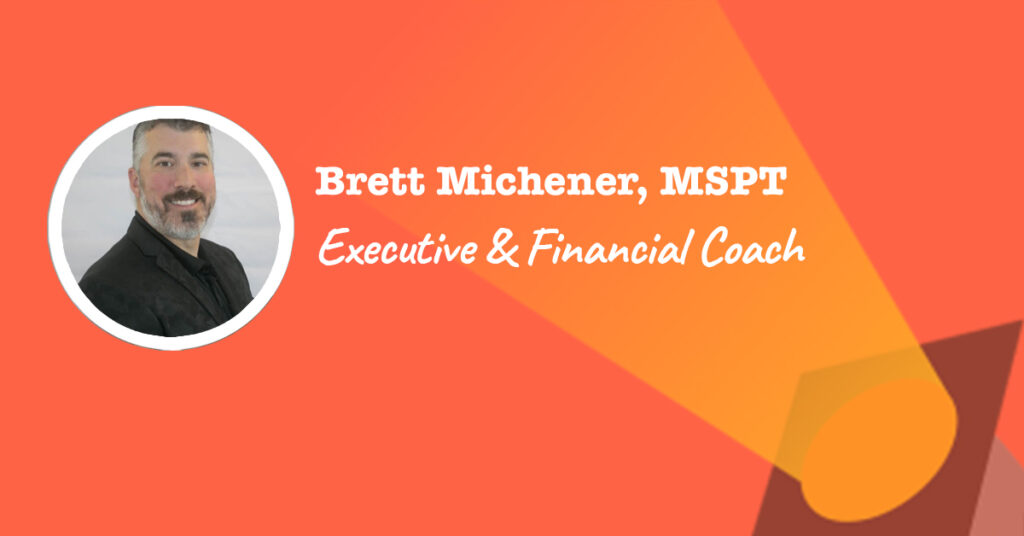This week’s spotlight features Brett Michener, a PT who became an executive and financial coach.
This post may contain affiliate links or codes. This won’t increase your cost, but it helps keep TNCPT alive, and free of annoying ads! Thank you for your support. 🙂
What is your full name and title at your current job?
Brett Michener
Executive and Financial Coach
Where are you located?
Mount Laurel, NJ
Where did you go to PT school, and what year did you graduate?
University of the Sciences in Philadelphia, 2000
What did you do when you first finished school, and for how long?
I worked in outpatient ortho for 17 years. I spent 13 of those years in my own private practice.
What did you enjoy about your early roles? What didn’t you enjoy?
I enjoyed some level of autonomy and running the show.
I did not enjoy missing dinner time with my family 3-4 nights per week.
When and why did you realize you wanted to do something non-clinical?
I wanted to find ways to impact peoples’ lives on a broader scale.
What are you doing these days?
I coach professionally as well as all aspects of personal finance. Specifically, I work with business/clinic owners regarding their personal and business finances.
Are you still treating patients, or are you solely non-clinical?
I am solely non-clinical.
How long have you been in your current role?
3+ years
How did you find your job?
I was asked to join a practice while exiting my PT business
Did you get any special certifications along the way?
Yes, I took six exams covering health and life insurance licenses, as well as securities licenses.
How would one advance in your industry?
Meet people constantly and drink from a fire hose.
How have people reacted to you leaving patient care?
Everyone asks if I miss it.
Do you miss it?
I miss the moments when someone takes their first step in awhile. I miss the the moments when patients leave the depression of chronic pain behind, and I miss the moments when they realize they are going to be alright and maybe even better than before.
I still get some of that coaching my kids, but it’s not quite the same.
What’s a typical day or week in the life like for you?
My day starts at 5:30 am every day. I wrap up calls around 5:30 pm for practice and dinner. I do one last email check around 9:00 pm, then repeat the next day.
What are some of the challenges and rewards of being a financial representative?
It can be a challenge to separate myself from every other financial representative out there.
The rewards are endless, though. I love helping friends and family realize financial stability, and I love helping them create real plans and protection.
How do you think working as a PT prepared you for this role?
Empathy and listening skills are paramount in the financial business, as well as the coaching side.
Roughly speaking, how are the hours and pay compared to patient care?
There is no limit to how much you can make in finance. It’s just about how hard you want to work (and accepting the process for what it is).
What type of person do you think would do well in your role?
You have to have a large network of people who trust and respect you. You have to be seen as more than a therapist.
Do you work remotely or on-site?
Both
Is it hard to get into this industry?
Anyone with the will to learn (and start from scratch) can jump in to this industry. However, you will need to weather a two-year ramp up period.
You will have to study for every exam. Training is paramount and should be provided. There are numerous books out there, depending on who you want to service.
What is a typical career path for someone in your role?
25 years of building a business and then residuals.
What is next for you?
Between coaching and finance, I’m happy as a clam to do this for the rest of my career. I would consider angel investing in the future.
What would you recommend to someone who is considering going into a role like yours?
Your mentors in this business are everything. Process rules the day.
What would you like to change most in your profession, and why? How would you propose doing so?
I want to bring some humanity to the financial profession.
If you could give yourself one piece of career advice you wish you had earlier, what would it be?
Grow your practice faster and exit sooner.
If you could teach anything to today’s graduate students in your profession, what would it be?
Don’t expect to pay student loans and live on your own. Borrow the least amount possible and find a place where you can open your own clinic and specialize.
Do you have any special advice for others who want to follow in your footsteps?
If you have to take out student loans, take out as few as possible. Understand that you will never make more than 100K working for someone else.
Curious how your own skills can translate into the non-clinical world? Explore your options in Non-Clinical 101, the comprehensive, fun, and inspiring course everyone is talking about!





